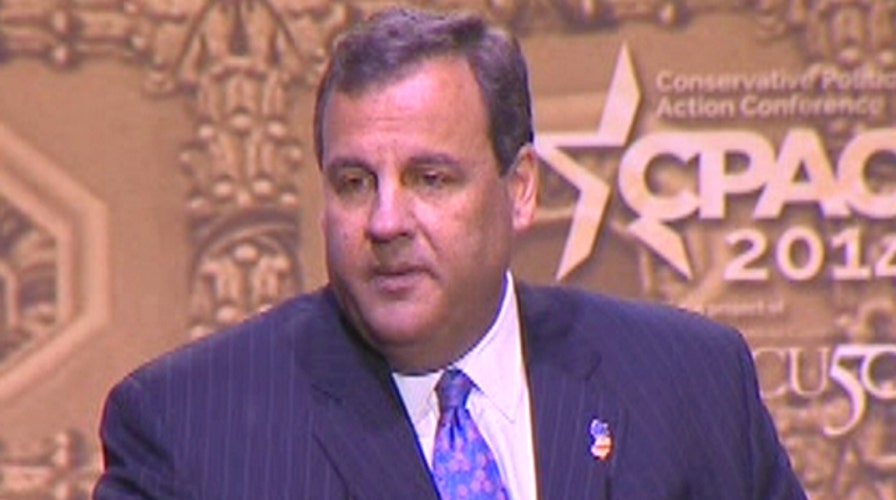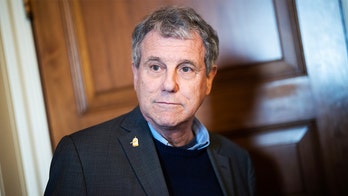Gov. Chris Christie speaks at CPAC
New Jersey governor speaks at annual conference for conservative activists
Also...
Nate Silver Trashes Most Pundits
Christie to Media: Drop Dead (And Take That, Washington Bloviators)
A year ago, Chris Christie would have had to buy a ticket to CPAC.
You'd think he might be even less popular this year, coming off the bruising battle over the George Washington Bridge scandal.
But the New Jersey governor got an invite from the premiere conservative conference in Washington--by definition a crowd that is somewhat cool to him, and used it to smack the media and what he called a "dysfunctional" Congress.
It's hardly a shocker that after being pounded by the press for a couple of months, Christie is no fan of a journalistic establishment that once doted on him.
"We have to stop letting the media define who we are and what we stand for," he declared.
While the mainstream media have come to view Christie as damaged goods, some conservatives are more sympathetic to him now that he's being hammered by liberal commentators. If MSNBC can't stand him, the thinking goes, he must be one of us.
But the scope of Christie's 2016 challenge is reflected in a Washington Post/ABC poll which found that three in 10 Republicans say they would not vote for him for president--the highest percentage of naysayers of any candidate tested. Another 9 percent said they would definitely vote for Christie, and 50 percent said they would consider doing so.
By contrast, 24 percent of Republicans said they would not vote for Mike Huckabee, 23 percent said Mitt Romney (who's not running), 21 percent said Rick Perry, 20 percent said Ted Cruz and 18 percent said Jeb Bush. (The former Florida governor has a different problem: if he runs and wins the nomination eight years after his brother left the White House, 50 percent of registered voters overall say they would definitely not vote for him. Some 37 percent of registered voters say they definitely wouldn't vote for Hillary.)
When Christie walked out onto the stage, his goal was twofold: to turn the page on Bridgegate, and to ingratiate himself with this huge gathering of grassroots activists.
He didn't go the much-mocked Romney route of declaring himself a "severely conservative" governor, but he did pronounce himself "a pro-life governor." He ticked off his record on reforming pensions and teacher tenure in his state, and praised such other GOP governors as John Kasich, Scott Walker and Rick Scott.
Beyond another swipe at the media, Christie said a reporter asked him how he'd fare given the party's intolerance on social issues--he carried a message of making government work.
He stayed miles from the abolish-the-IRS rhetoric of fellow CPAC speaker Ted Cruz.
"We need to talk about what we're for," Christie said.
And in a veiled slap at overly ideological candidates, the blue-state executive said, "We don't get to govern if we don't win.
Christie revived an argument he was starting to make before the bridge scandal: that Washington (and by extension the senators like Cruz and Rand Paul who may run for president) is full of hot air. "In Washington they can't stop talking." "The most dangerous 10 feet" is between a politician and a camera. The pols are "standing on the sidelines and spitballing."
A good argument for a can-do governor---unless he's so paralyzed by home-state investigations that he's drowning in negative headlines.
CPAC is your basic cattle call, and its straw poll (often won in the past by Ron Paul) is meaningless. But it attracts a tidal wave of media coverage, and a strong showing can definitely generate a bit of momentum.
On that score, you may be hearing a little bit about Saturday's keynote speaker, a former governor and Fox News contributor named Sarah Palin.
Footnote: A shout-out to Mary Katharine Ham, of Fox News and Hot Air, who was named CPAC's Blogger of the Year.
Nate Silver Trashes Most Pundits
Nate Silver, the data whiz who recently took his 538 venture from the New York Times to ESPN, doesn't think much of his competitors.
In the process of hiring applicants, Silver tells Time, he created a graph on his computer:
"The bottom two quadrants belong to the dregs of American journalism: on the left, sportswriters who cherry-pick statistics without thinking through them, and on the right, op-ed columnists, says Time.
Silver calls that "the crap quadrant. Two-thirds of the op-ed columnists at America's major newspapers are worthless.
Bold words from a mild-mannered guy. Does he dare to name names?





